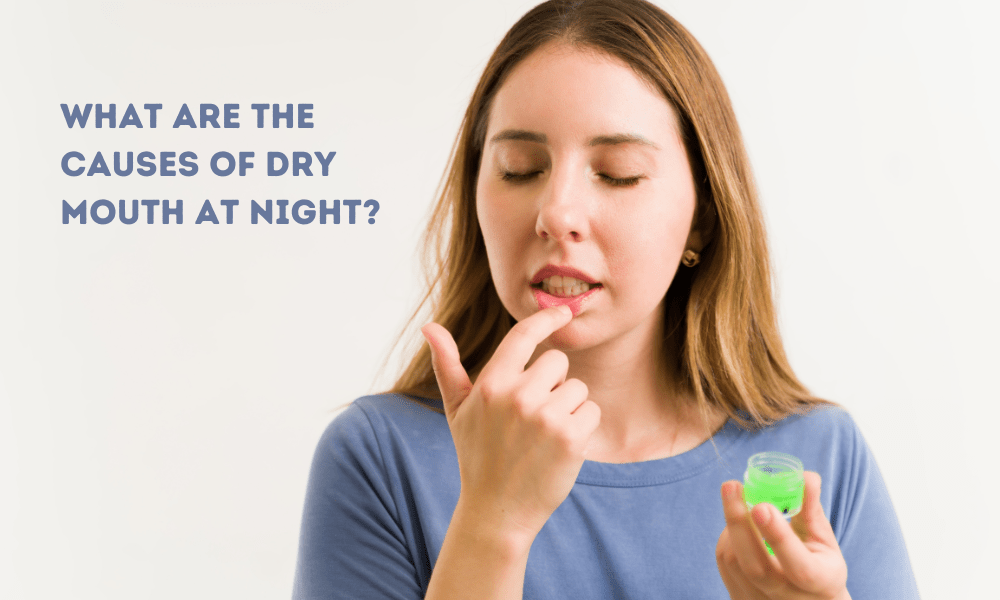
Dry mouth, also known as Xerostomia, is a condition characterized by a reduced flow of saliva in the mouth. Saliva plays a crucial role in maintaining oral health by keeping the mouth moist, aiding in digestion, and preventing the growth of harmful bacteria. While dry mouth can occur at any time, experiencing it primarily at night can disrupt sleep and lead to various oral health issues.
In this article, we will delve into the normal salivary function, understand the phenomenon causes of dry mouth, provide tips for managing it, and emphasize the importance of seeking professional care.
What is Nocturnal Dry Mouth?
Nocturnal dry mouth refers to the condition where individuals experience dryness in their mouth primarily during the night. This condition can be particularly troublesome as it can disturb sleep patterns, lead to discomfort, and create an environment conducive to dental problems.
Causes of Dry Mouth at Night
Several factors contribute to experiencing dry mouth at night
1. Breathing Through the Mouth
Many people unconsciously switch to breathing through their mouths while sleeping, especially if they have allergies, congestion, or sleep apnea. This continuous flow of air over the oral tissues can lead to dryness.
2. Medications
Certain medications, such as antihistamines, decongestants, antidepressants, and muscle relaxants, can cause a decrease in salivary flow as a side effect.
3. Dehydration
Failure to consume sufficient water throughout the day can lead to dehydration, causing dry mouth at night.
4. Medical Conditions
Systemic conditions like diabetes, Sjogren’s syndrome, and autoimmune disorders can result in reduced salivary flow.
5. Aging
As we age, salivary glands may produce less saliva, making elderly individuals more susceptible to dry mouth.
6. Snoring
Sleep apnea can result in breathing through the mouth, contributing to dryness.
Symptoms of Nocturnal Dry Mouth
Here are the common symptoms associated with nocturnal dry mouth:
- Throat Discomfort – When you get up in the morning, the lack of moisture in your mouth and throat may cause you to have a dry, scratchy, or sore throat.
- Swallowing Difficulties – Reduced saliva might make it uncomfortable to swallow food, liquids, or even your own saliva.
- Bad Breath – Saliva aids in clearing the mouth of microorganisms and food residue, which can cause bad breath (halitosis). Bacteria can multiply when saliva production is limited, which can cause bad breath.
- Taste Modification – Dry mouth can alter your perception of taste, making some foods taste bland or strange.
- Cracked Lips & Mouth Sores – Dry, cracked lips and mouth sores are both caused by a lack of moisture, which also raises the possibility of mouth sores.
- Increased Dental Cavities – By neutralizing acids and supplying minerals to strengthen enamel, saliva plays a vital role in defending your teeth. An increased risk of dental decay and cavities might result from decreased salivation.
- Gum Irritation – A dry mouth can irritate the gums, making them sensitive, irritated, and more prone to bleeding.
- Sleep Disruption – Nocturnal dry mouth can cause sleep disruption, causing you to wake up for glasses of water or making it uncomfortable for you to get a good night’s sleep.
- Dry or Burning Sensation – Your mouth, especially the back of your throat, may feel dry or burning.
- Speech issues – Less saliva might make it more difficult to speak words clearly, which can cause speech issues.
Tips for Managing Nocturnal Dry Mouth
1. Stay Hydrated – Ensure adequate water intake throughout the day to prevent dehydration.
2. Humidify the Bedroom – Using a humidifier in the bedroom can add moisture to the air and prevent dryness.
3. Limit Caffeine and Alcohol – These substances can contribute to dehydration and worsen dry mouth.
4. Practice Good Oral Hygiene – Brush and floss regularly to maintain oral health and reduce the risk of complications.
5. Use Saliva Substitutes – Over-the-counter saliva substitutes can help alleviate dryness temporarily.
6. Consult a Healthcare Professional – If dry mouth persists, it’s essential to consult a dentist or healthcare provider, like Dant Suraksha dental clinic, to identify and address the underlying causes.
Conclusion
Nocturnal dry mouth can significantly impact oral health and overall well-being. Understanding its causes, such as mouth breathing, medications, dehydration, and medical conditions, is crucial to managing the condition effectively. By following the tips provided and seeking professional care when necessary, individuals can alleviate discomfort and promote oral health.